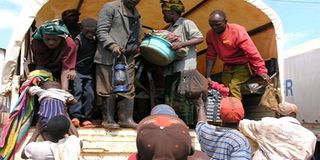Life in Nyarugusu refugee camp

The Nyarugusu Camp in Tanzania is located in the western province of Kigoma, Tanzania. Established in 1996 to accommodate refugees from the First Congo War.
What you need to know:
According to a report from International Refugee rights Initiative, current legislation prevents refugees from building sustainable, independent livelihoods. Refugees are not entitled to pursue employment opportunities other than by engaging in small income-generating activities within the confines of the camps.
Dar es Salaam. The Term “down but not defeated” comes to mind when you visit Nyarugusu camp in Kasulu Kigoma where a number refugee academicians and artists from Democratic Republic of Congo (DRC) have lived for 20 years with little hope of brighter future.
One of them is Benja Estiko, 17, who resides at Charity Upendo Village in Nyarugusu Camp. He was born in the camp when his parents fled their country in 1996 to escape the political and ethnic violence.
Blessed with a voice of an angel which, when he sings makes you believe that another Christian Bella is in the making, does not know what the future holds for him so long as he continues to be a refugee.
He is among thousands other refugees who have lost hope of their future including Fortunata Shantel, 41, Barnabus Nyambu, 35, who holds master’s degree on development policy, among many others who attained higher education here in Tanzania, nut are left seating at the camps praying for a better tomorrow. The clashes in their home country have left them not only without a job, by sent them to a place where hope of finding employment is none, as long as they continue to remain refugees.
Nyarugusu refugee camp is located about 150km from Lake Tanganyika in Kigoma Region. It was established in 1996 when war broke out in the neighbouring DRC.
Over 150,000 people from eastern DRC crossed Lake Tanganyika to escape the political and ethnic violence. Now, 20 years later, Nyarugusu is still home to about 70,000 people, who cannot return to their country due to sustained war and instability.
According to the United Nations High Commission for Refugees (UNHCR), Tanzania is considered one of the world’s major refugee-receiving states. There are currently 253,190 refugees in the country, with Burundian and
Congolese refugees comprising the majority.
Additionally, the current instability in Burundi has increased the number of individuals seeking refuge in the country. As of last May, international aid organisations have estimated that anywhere between47,000 and 70,000 new Burundi refugees have arrived in Tanzania since the inception of the recent political crisis in the country.
Despite this all, the refugees have not lost hope that one day things will change and allow them to lead normal lives which allows free movement, right to employment in order to earn a living and the freedom to exercise one’s talents.
According to a report from International Refugee rights Initiative, current legislation prevents refugees from building sustainable, independent livelihoods. Refugees are not entitled to pursue employment opportunities other than by engaging in small income-generating activities within the confines of the camps.




